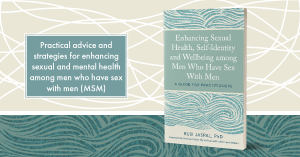Rusi Jaspal is Professor of Psychology and Sexual Health at De Montfort University, Leicester. His new book is a practical guide for clinicians working with men who have sex with men. In this blog, Rusi explores why some gay men are turning to chemsex, which is on the rise, and why it can be problematic.
In the last few years, drug use in sexualised settings (or ‘chemsex’) has emerged as a significant public health concern for gay men. The practice involves the use of psychoactive drugs, such as mephedrone, γ-hydroxybutyrate (GHB), γ-butyrolactone (GBL), and crystallised methamphetamine, to facilitate and enhance sexual encounters – often in group settings – that can last for hours or days and with multiple partners.
The drugs have varying effects on the individual – while mephedrone raises your heart rate and blood pressure, resulting in increased sexual arousal, GHB and GBL function as potent psychological disinhibitors. Chemsex users tend to report better sexual experiences given that some of the substances reduce inhibitions and increase sexual pleasure. Chemsex can also make some people feel better about themselves – temporarily at least – as it can provide a buffer against some of the traumatic experiences that we know are particularly prevalent among gay men. Such traumatic experiences include childhood sexual abuse, long-term exposure to homophobia and, in the case of those living with HIV, HIV stigma. These events can leave a lasting psychological mark on those who experience them.
The practice of chemsex itself can become addictive because it can appear to be a solution to the problems some gay men face and wish to escape. After all, few people ask about HIV status on the chemsex scene, which removes the difficult issue of having to disclose your HIV status and the risk of rejection due to HIV stigma. Some gay men come to find ‘sober’ sex unsatisfactory and feel that it meets neither their physical nor emotional needs.
How many men engage in chemsex?
We do not really know for sure how prevalent chemsex is among gay men in the UK. But the data we do have suggest that it is practiced widely. The Chemsex Study (Bourne et al. 2014) found that a fifth of survey respondents living in Lambeth, Southwark and Lewisham reported having engaged in chemsex in the last five years and that a tenth had done so in the last four weeks. Over a fifth of the 1484 HIV-negative or undiagnosed gay men recruited from 20 sexual health clinics in the UK had engaged in chemsex in the last three months (Sewell et al. 2017). In a retrospective case notes review study in two London sexual health clinics, Lee et al. (2015) found that 59 per cent of gay men who used the clinic in the latter half of 2014 reported chemsex. These statistics are not representative of all gay men in the UK but they tell us that chemsex is a signifcant issue.
But why is chemsex problematic?
The truth is that for some gay men it never becomes a problem – they engage in it occasionally and recreationally, maintaining the ability to disengage when they wish to. But for others, it does become a problem. It can interfere with other aspects of life, such as work, family life, friendships and relationships. Engagement in chemsex can increase risk of serious infections, such as HIV and hepatitis C. The risk of death from overdose is a significant one.
It is heartening to see that there is increasing support for gay men involved in chemsex. The groundbreaking work of David Stuart at 56 Dean Street has made an important impact on the lives of many gay men struggling with chemsex. This work has sought to identify the complex psychosocial underpinnings of chemsex. His ChemSex Care Plan ™ is just one excellent example of the support that is now available to gay men who are asking for help – a means of giving gay men the self-efficacy to promote positive change in their lives.
As a complex and poorly understood psychosocial phenomenon, chemsex continues to have an insidious effect on the lives of many gay men. In my forthcoming book ‘Enhancing Sexual Health, Self-Identity and Wellbeing among Men Who Have Sex With Men: A Guide for Practitioners’, I aim to sensitise practitioners involved in the care of gay men around the possible antecedents of chemsex and associated risk behaviours. Practitioners play a fundamental role in enhancing sexual health. To do so, they must understand chemsex – both its antecedents and its consequences. In my book, I discuss chemsex not as an addiction but as a form of ‘escapism’ or a way of attempting to cope with psychological stress. Viewing chemsex in these terms can enable us to understand why gay men may be engaging in it, the needs they may be attempting to address and, crucially, to think of creative ways of providing effective support.
For more information on Rusi’s new book, click here.
For more exclusive content from our authors and updates on new books, why not join our mailing list?
You can also follow us on Twitter @JKPGender and on Facebook @JKPGenderDiversity.
